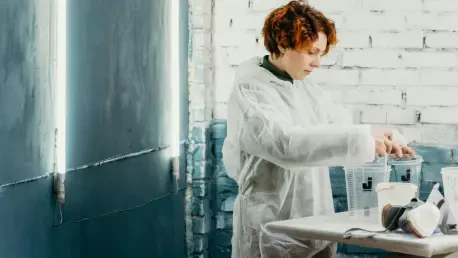In a groundbreaking move to push the boundaries of sustainable practices, the National Science Foundation has awarded $1.9 million to the Samueli School of Engineering at UCLA. This grant forms part of a larger $7.5 million initiative aimed at revolutionizing chemical manufacturing by employing sustainable methodologies. A novel approach is spearheaded by UCLA’s associate professor, Samanvaya Srivastava, focusing on developing a cell-free biomanufacturing process. The innovative process utilizes custom enzymes and cutting-edge materials to simplify production. By organizing enzyme-catalyzed reactions outside living cells, this method reduces costs, simplifies scaling, and minimizes environmental impact. It promises a breakthrough in producing chiral amines, critical components of pharmaceuticals, which have traditionally been made through resource-heavy methods that result in significant waste.
Revolutionary Biomanufacturing Approach
Central to this initiative is the leadership of Han Li from UC Irvine, along with collaborative efforts from UCLA, the University of Tennessee, and industry partners like Cascade Bio. Srivastava’s research on synthetic coacervate systems is pivotal, providing membraneless compartments that allow precise coordination of multi-enzyme cascades. This process reintroduces spatial organization akin to living cells, crucial for efficient enzyme reactions, into cell-free systems. By overcoming the traditional limitations of biomanufacturing, this approach aims to transform the production of high-value molecules, making it more sustainable and economically viable. The methodology is not only innovative but pivotal in transitioning from research to scalable commercial applications. Additionally, the initiative places a strong emphasis on workforce training, ensuring that the skills essential for advancing and adopting these technologies are disseminated across academic and industry sectors.
Integrating Innovation and Industry Collaboration
The initiative has sparked the establishment of a startup, Praio, now integrated within an incubator at Lawrence Berkeley National Laboratory. This comprehensive project demonstrates a unified vision among academic and industrial sectors regarding the promise of cell-free biomanufacturing, expected to greatly enhance the U.S. bioeconomy. Through the marriage of forward-thinking science and cooperative endeavors, the project aims to forge sustainable and efficient manufacturing techniques. Beyond mere technical advancements, it nurtures a symbiotic relationship between scholarly discourse and industrial application, facilitating a smooth transition to practical, scalable solutions. Such collaboration highlights the ambition to impact chemical manufacturing and pave the way for a sustainable future. As the initiative evolves, its influence is projected to extend past the chemical industry, possibly affecting multiple sectors. Aligning innovation with sustainability goals sets a blueprint for future initiatives, poised to address both current and forthcoming environmental and economic challenges.









